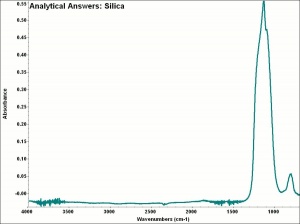Difference between revisions of "Silica"
| Line 15: | Line 15: | ||
== Physical and Chemical Properties == | == Physical and Chemical Properties == | ||
| − | Soluble in hydrofluoric acid. Density = 2.2 (amorphous) and 2.65 (quartz). | + | * Soluble in hydrofluoric acid. |
| + | * Density (g/ml) = 2.2 (amorphous) and 2.65 (quartz). | ||
{| class="wikitable" | {| class="wikitable" | ||
| Line 23: | Line 24: | ||
|- | |- | ||
! scope="row"| Melting Point | ! scope="row"| Melting Point | ||
| − | | 1710 | + | | 1710 C |
|- | |- | ||
! scope="row"| Boiling Point | ! scope="row"| Boiling Point | ||
| − | | 2230 | + | | 2230 C |
|} | |} | ||
Revision as of 08:47, 31 May 2022
Description
Colorless crystals or white amorphous powder. Silica is widely available because it makes up one of the largest portions of the earth's crust. In its purest form, silica, or silicon dioxide, occurs as crystalline Quartz. The more common, but less pure, forms are Quartzite, Sandstone, Flint, Agate, and Sand. The fossil form of silica is Diatomaceous earth. All forms of silica are inert, unaffected by heat, insoluble in strong acids (except hydrofluoric) and slowly attacked by strong alkalis. Silica is not commonly used as a pigment, however, it is found in grounds, primers and wood fillers. Silica is used in the manufacture of glass, water glass, abrasives, ceramics and enamelware.
See also Fumed silica, and Silica gel.
Synonyms and Related Terms
silicon dioxide; silicic anhydride; quartz; silex; diatomaceous earth; flint; diatomite; sand; quartzite; sandstone; amethyst; jasper, chalcedony; agate; onyx; tridymite; opal; cristobalite; Pigment White 27; Siliziumdioxid (Deut.); Kieselgur (Deut.); Kieselerde (Deut.); silice (Fr., Esp., It.); chalazias (Gr.); kwarts (Ned.); sílica (Port.)
Risks
Noncombustible. Toxic by inhalation. Chronic exposure to dust may cause silicosis
Physical and Chemical Properties
- Soluble in hydrofluoric acid.
- Density (g/ml) = 2.2 (amorphous) and 2.65 (quartz).
| Composition | SiO2 |
|---|---|
| Melting Point | 1710 C |
| Boiling Point | 2230 C |
Comparisons
Properties of Common Abrasives
Characteristics of Common White Pigments
Resources and Citations
- R. J. Gettens, G.L. Stout, Painting Materials, A Short Encyclopaedia, Dover Publications, New York, 1966
- G.S.Brady, Materials Handbook, McGraw-Hill Book Co., New York, 1971 Comment: p. 708
- Ralph Mayer, A Dictionary of Art Terms and Techniques, Harper and Row Publishers, New York, 1969 (also 1945 printing)
- Richard S. Lewis, Hawley's Condensed Chemical Dictionary, Van Nostrand Reinhold, New York, 10th ed., 1993
- Michael McCann, Artist Beware, Watson-Guptill Publications, New York City, 1979
- Matt Roberts, Don Etherington, Bookbinding and the Conservation of Books: a Dictionary of Descriptive Terminology, U.S. Government Printing Office, Washington DC, 1982
- Dictionary of Building Preservation, Ward Bucher, ed., John Wiley & Sons, Inc., New York City, 1996
- Random House, Webster's Encyclopedic Unabridged Dictionary of the English Language, Grammercy Book, New York, 1997
- The Merck Index, Martha Windholz (ed.), Merck Research Labs, Rahway NJ, 10th edition, 1983 Comment: entry 8637
- The American Heritage Dictionary or Encarta, via Microsoft Bookshelf 98, Microsoft Corp., 1998
- Art and Architecture Thesaurus Online, http://www.getty.edu/research/tools/vocabulary/aat/, J. Paul Getty Trust, Los Angeles, 2000
